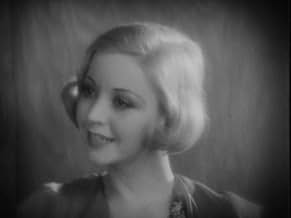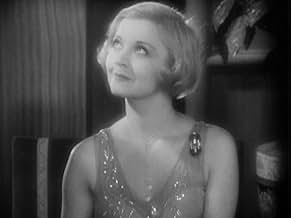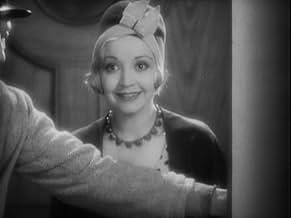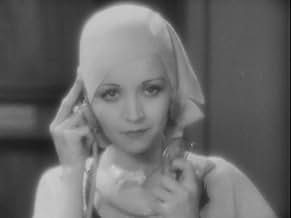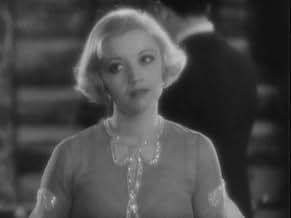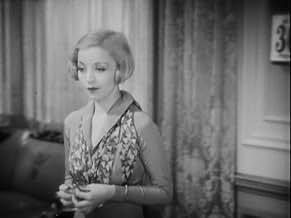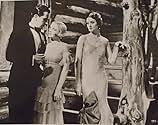Ajouter une intrigue dans votre langueRich party girl sets her eyes on a young attorney.Rich party girl sets her eyes on a young attorney.Rich party girl sets her eyes on a young attorney.
- Director
- Writers
- Stars
Sayre Dearing
- Kay's Friend
- (uncredited)
Geraldine Dvorak
- Party Guest
- (uncredited)
Jay Eaton
- Party Guest
- (uncredited)
Adolph Faylauer
- Party Guest
- (uncredited)
Dick Gordon
- Party Guest
- (uncredited)
Thelma Hill
- Friend
- (uncredited)
Lloyd Ingraham
- Judge Drake
- (uncredited)
Jane Keckley
- Office Cleaning Woman
- (uncredited)
Fred Kelsey
- Policeman
- (uncredited)
Marian Marsh
- Kay's Friend
- (uncredited)
Avis en vedette
While not a particularly good film, "The Naughty Flirt" does have some enjoyable moments. Traces of director Cline's comedy short background can be found in several scenes--most of the comedy being visual. Myrna Loy is good as the scheming one, with her best movie years still ahead. Alice White does well in a role more suited to her talents. The studio tried to turn her into this big song and dance star with the advent of talkies but she was much more comfortable in comic roles, as she displays in this movie and later ones. This was her last First-National film and by this time nobody cared. She did make a reasonably successful comeback a few years later, in comedy roles, which she should have been given from the start. The supporting players also do well but the film, as a whole, does not. The cast tries hard but is overcome by weak material. Still, it's worth a peek.
"The Naughty Flirt" is a delightful period piece that evokes the (relatively) care-free life many of the very rich maintained even in aftermath of the 1929 stock market crash.
Alice White plays the spoiled socialite Miss Katherine 'Kay' Elliott and does a very charming comic turn. This is a Pre-Code film in which the figures of all the female beauties are provocatively shown off in revealing attire in the party scenes. While the sex - including a somewhat surprising spanking scene - is played up, the prohibition age drinking is can only be suggested.
The film starts with a gay gang of young socialites in the back of a Police Paddy Wagon headed to the police station to be booked on creating a public nuisance. It seems pretty obvious they've all been drinking as well as dancing at a riotous rooftop party.
White as Kay is quite the unflappable flapper, a Daddy's girl with an income of $100,000 a year. Imagine what that could buy in 1931! She's been kicked out of every fine private school her father could get her into and is the dedicated decadent until her world is turned around by a straight-laced country-boy-turned lawyer who happens to work for her Dad's firm.
It's a classic case of opposites attract - with a dash of Taming of the Shrew. The two are instantly drawn to each other starting when the lawyer, Alan Ward (Paul Page), - studiously attending a session of night court at the police station - first lays eyes on the naughty platinum blonde.
Their romance is tested by a scheme masterminded by Linda Gregory (Myrna Loy) and her brother Jack (Douglas Gilmore) who wants to marry her for money. These dark characters hope to recover from the loss of their fortune in the stock market crash.
There are also trust issues as regular guy Alan attempts to gage the loyalty of this 'belle of the ball' while taking stock of her seemingly countless admirers.
I saw this on TCM which has a very high technical standard. I'm always impressed at how quickly sound movies progressed. Just four years into the sound era, there's a scene with a wax cylinder Dictaphone in which we listen in as White puts on headphones and hears the recording of Alan speaking for dictation and then get sidetracked into another far more personal conversation with a friend drops into his office unexpectedly. The sound is played back in the scratchy Dictaphone mode - differentiating it from the regular sound.
This is a fun and funny story, providing a glimpse into a fascinating age (especially if you were rich) where Jazz Age attitudes intersected with an elite American Anglophile culture.
Alice White plays the spoiled socialite Miss Katherine 'Kay' Elliott and does a very charming comic turn. This is a Pre-Code film in which the figures of all the female beauties are provocatively shown off in revealing attire in the party scenes. While the sex - including a somewhat surprising spanking scene - is played up, the prohibition age drinking is can only be suggested.
The film starts with a gay gang of young socialites in the back of a Police Paddy Wagon headed to the police station to be booked on creating a public nuisance. It seems pretty obvious they've all been drinking as well as dancing at a riotous rooftop party.
White as Kay is quite the unflappable flapper, a Daddy's girl with an income of $100,000 a year. Imagine what that could buy in 1931! She's been kicked out of every fine private school her father could get her into and is the dedicated decadent until her world is turned around by a straight-laced country-boy-turned lawyer who happens to work for her Dad's firm.
It's a classic case of opposites attract - with a dash of Taming of the Shrew. The two are instantly drawn to each other starting when the lawyer, Alan Ward (Paul Page), - studiously attending a session of night court at the police station - first lays eyes on the naughty platinum blonde.
Their romance is tested by a scheme masterminded by Linda Gregory (Myrna Loy) and her brother Jack (Douglas Gilmore) who wants to marry her for money. These dark characters hope to recover from the loss of their fortune in the stock market crash.
There are also trust issues as regular guy Alan attempts to gage the loyalty of this 'belle of the ball' while taking stock of her seemingly countless admirers.
I saw this on TCM which has a very high technical standard. I'm always impressed at how quickly sound movies progressed. Just four years into the sound era, there's a scene with a wax cylinder Dictaphone in which we listen in as White puts on headphones and hears the recording of Alan speaking for dictation and then get sidetracked into another far more personal conversation with a friend drops into his office unexpectedly. The sound is played back in the scratchy Dictaphone mode - differentiating it from the regular sound.
This is a fun and funny story, providing a glimpse into a fascinating age (especially if you were rich) where Jazz Age attitudes intersected with an elite American Anglophile culture.
Minor but amusing comedy starring that little kewpie doll, Alice White.
For a few years in the late 20s and early 30s White was a big name and starred in a series of comedies and musicals.
In THE NAUGHTY FLIRT she plays a spoiled rich girl who travels in a fast set of country club kids. She runs across a staid lawyer in night court when the "gang" has been hauled in for disturbing the peace at a local dive. He works in her father's law firm.
Because he ignores her she floods him with invitations and finally lures him to a party where he continues to ignore her and pay attention to her rival, Myrna Loy. Of course this drive the little flirt crazy. The "Cinderella Dance" is interesting to say the least.
Myrna and her brother are almost broke (it's 1931) and they have a scheme for him to marry White with her $100,000/year income. So there are some more complications before the final clinch.
Alice White was the Goldie Hawn of her day, a delightful actress who could sing a little and dance a little. She was a rival to Clara Bow and was probably the last of the flappers. She's very good in this comedy. Myrna Loy has fun as the bitchy rival who schemes for money. Paul Page (looking like Fredric March) plays the lawyer. Robert Agnew is Wilbur, George Irving is the father, Douglas Gilmore is Jack, Fred Kelsey is the cop, and Lloyd Ingraham is the judge.
Cute film.
For a few years in the late 20s and early 30s White was a big name and starred in a series of comedies and musicals.
In THE NAUGHTY FLIRT she plays a spoiled rich girl who travels in a fast set of country club kids. She runs across a staid lawyer in night court when the "gang" has been hauled in for disturbing the peace at a local dive. He works in her father's law firm.
Because he ignores her she floods him with invitations and finally lures him to a party where he continues to ignore her and pay attention to her rival, Myrna Loy. Of course this drive the little flirt crazy. The "Cinderella Dance" is interesting to say the least.
Myrna and her brother are almost broke (it's 1931) and they have a scheme for him to marry White with her $100,000/year income. So there are some more complications before the final clinch.
Alice White was the Goldie Hawn of her day, a delightful actress who could sing a little and dance a little. She was a rival to Clara Bow and was probably the last of the flappers. She's very good in this comedy. Myrna Loy has fun as the bitchy rival who schemes for money. Paul Page (looking like Fredric March) plays the lawyer. Robert Agnew is Wilbur, George Irving is the father, Douglas Gilmore is Jack, Fred Kelsey is the cop, and Lloyd Ingraham is the judge.
Cute film.
Spoiled rich girl Kay Elliott (Alice White) can't settle down, or even settle on one guy. In Naughty Flirt, she battles with Alan Ward (Paul Page -only made a few films) and Linda Gregory (Myrna Loy, three years before the Thin Man series) Alice White made many films, but none seem to be well known. She had been in the original, silent "Gentlemen Prefer Blondes" 1928. White appeared in more than her share of movies with suggestive names (Naughty Baby, Hot Stuff, Lingerie, Playing Around) This is a good story, but you can tell it was made just as sound was coming in play - they were heavy on the eye makeup, and they even use subtitle cards several times. Also a music track playing under most of the dialogue. Keep an eye out for Fred Kelsey as the cop at the beginning - made a career out of playing the policeman (the Man Who Came to Dinner, Larceny Inc, the Bride Walks Out)
This is a small film and isn't really about much more than a bunch of spoiled rich kids finding out that there is more to life than just being minor league juvenile delinquents. But there are a number of things that make this charming and fun and it's under an hour long so there's not much to lose.
First of all, as many have said, Alice White is such a quintessential flapper that it's no wonder she didn't last beyond the Clara Bow years. Her New Joisey oops Jersey accent is a hoot and different from that of the great prima donna actresses of the era. There is a sequence early in the film where she bats her eyes at Paul Page while riding in a car and she more than bats them. Her eyes are so enormous and dominant that they practically do cartwheels flirting with him. In short, as a male, I find her irresistibly cute and delightful and her firm, clear delivery of lines (essential in early talkies for theaters with not so great sound systems) stands out with the sharpness of a female Eddie Cantor.
Watch also for the barely seen singing group at the big party where microphones are not yet de rigeur and the ensemble sings through megaphones! The flapper clothes are all wonderful and so are the beautiful cars so if you like period fun this is a delight. Myrna Loy is still in her bad girl period here and makes a nasty femme fatale. Paul Page is a Frederic March clone as a leading man and shows naturalness and real talent. Too bad his career simply faded away after 1934.
There's nothing super spectacular here but either you find Alice White doing her naughty flirting is as they used to say "the bee's knees" or you don't. It's easy to underestimate the way she uses her eyes, her body language and her desire to get the most out of every scrap of dialogue she gets. I'm so sorry she had such a fall from grace and a difficult later life but she has become a cult figure for movie buffs who love the early talkies.
Le saviez-vous
- Citations
Invitation: Miss Kay Elliott / requests the honor of your presence / at an informal party given / in Honor of her Annual Expulsion / from Miss Baynor's Select School / for Young Ladies // Embassy Roof / Saturday May third / ten P. M. until?---
- Bandes originalesUntitled Song
(uncredited)
Composer unknown (probably Sam H. Stept)
Played during the opening credits and often as background music
Played as dance music at the country club and sung ("I often wonder if you cared ...") by an unidentified trio
Hummed by Paul Page
Meilleurs choix
Connectez-vous pour évaluer et surveiller les recommandations personnalisées
Détails
- Durée
- 56m
- Couleur
Contribuer à cette page
Suggérer une modification ou ajouter du contenu manquant

